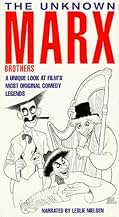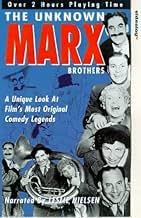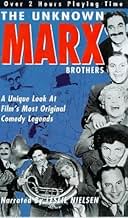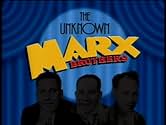Aggiungi una trama nella tua linguaA tribute to the lives and careers of the Marx Brothers utilizing rare archival footage and personal interviews.A tribute to the lives and careers of the Marx Brothers utilizing rare archival footage and personal interviews.A tribute to the lives and careers of the Marx Brothers utilizing rare archival footage and personal interviews.
Harpo Marx
- Self
- (filmato d'archivio)
- …
Zeppo Marx
- Various Roles
- (filmato d'archivio)
Robert Dwan
- Self - Director: 'You Bet Your Life'
- (as Bob Dwan)
Miriam Marx
- Self - Groucho's Older Daughter
- (as Miriam Marx Allen)
Irving Brecher
- Self - Screenwriter-Director
- (as Irv Brecher)
Jack Benny
- Self
- (filmato d'archivio)
Milton Berle
- Self
- (filmato d'archivio)
Bill Cosby
- Self
- (filmato d'archivio)
Trama
Lo sapevi?
- Versioni alternativeVideo version runs 126 minutes.
- ConnessioniFeatures Troppi baci (1925)
Recensione in evidenza
Competent biography of Groucho, Chico, Harpo, Gummo, and Zeppo, known as the four Marx brothers, who became famous for their rough-hewn vaudeville humor and ad libs. I'm only laying that information out because I fear that we currently share so little of a common data base that some of us have never heard of the Marx brothers. I mean, in a country in which 29% of us can't name the Vice President of the United States, according to a Newsweek poll in 2011, how much can we assume about knowledge of the Marx brothers? Really.
I'm not sure there's that much material in this biographical documentary that's not already known to the mavens of Marx. They grew up poor on New York's Upper East Side and were more or less steered into show business by their mother, Minnie. Several anecdotes were news to me. I'd had no idea that they were such a successful team as early as 1915 that they played the Palace Theater in New York. But the most impressive features of these tales by a handful of talking heads -- relatives and colleagues -- is the picture of poverty they convey. Groucho, for instance, may have been named after a "grouch bag" that boys carried. They kept their personal effects in it -- pennies, marbles, pebbles, bits of string. My God, it sounds like Dickens.
They went on to success on Broadway, when having a hit on Broadway was a legendary act. When movies began talking, around 1930, the Marx brothers were "snapped up." By that time they were forty years old. Their first movies were for Paramount Studios and near anarchy ruled. There was no hesitation about breaking the fourth wall. When receipts for "Duck Soup" weren't as high as expected, Paramount lose interest. In the mid-30s they were taken over by MGM under Irving Thalberg, who gave them their own unit and shaped their films. Thalberg had the brothers go on tour and test their jokes in front of live audiences. The laughs were timed in order to improve the editing of the film that was to come.
Their first MGM film was "A Night At The Opera" and it was a great success. "A Day At The Races" was also produced with Thalberg's guidance but then he died at an early age of pneumonia. The guidance they received afterward never really cleared the bar established by Thalberg and writers like George S. Kaufmann and S. J. Perelman. "The Big Store" was something of a disappointment. By this time the brothers were in their 50s and their careers declined. None of them need money except Chico, who gambled a good deal.
When the war ended in 1945 -- notice how carefully I include the date because, after all, if so many can't name the vice president, can we all be expected to know when the war ended? PS: Kids, that war was known as "World War II." It came after "World War I." When the war ended in 1945, the Marx brothers' movie careers were over but each made extensive appearances on the radio and on the new medium of television. Groucho went on to win a Peabody Award for Best Entertainment on his quiz show, "You Bet Your Life." Much of the film is given over to excerpts from "You Bet Your life." We can watch about ten minutes of Jack Benny in a disguise appearing as a contestant, and it's still very funny indeed.
Eventually, the television appearance ended, as all enterprises must.
This isn't a very challenging or "deep" documentary. It's a viewer-friendly celebration of a couple of brothers who at one time or another made everyone laugh. That's what it aims to do and it succeeds. There is nothing much about Gummo, and nothing about Zeppo's disappearance. There isn't a word about the woman who took over Groucho's life in his old age and ran it like a tyrant, Erin Fleming. It may be just as well that the producers left the sordid stuff out.
I'm not sure there's that much material in this biographical documentary that's not already known to the mavens of Marx. They grew up poor on New York's Upper East Side and were more or less steered into show business by their mother, Minnie. Several anecdotes were news to me. I'd had no idea that they were such a successful team as early as 1915 that they played the Palace Theater in New York. But the most impressive features of these tales by a handful of talking heads -- relatives and colleagues -- is the picture of poverty they convey. Groucho, for instance, may have been named after a "grouch bag" that boys carried. They kept their personal effects in it -- pennies, marbles, pebbles, bits of string. My God, it sounds like Dickens.
They went on to success on Broadway, when having a hit on Broadway was a legendary act. When movies began talking, around 1930, the Marx brothers were "snapped up." By that time they were forty years old. Their first movies were for Paramount Studios and near anarchy ruled. There was no hesitation about breaking the fourth wall. When receipts for "Duck Soup" weren't as high as expected, Paramount lose interest. In the mid-30s they were taken over by MGM under Irving Thalberg, who gave them their own unit and shaped their films. Thalberg had the brothers go on tour and test their jokes in front of live audiences. The laughs were timed in order to improve the editing of the film that was to come.
Their first MGM film was "A Night At The Opera" and it was a great success. "A Day At The Races" was also produced with Thalberg's guidance but then he died at an early age of pneumonia. The guidance they received afterward never really cleared the bar established by Thalberg and writers like George S. Kaufmann and S. J. Perelman. "The Big Store" was something of a disappointment. By this time the brothers were in their 50s and their careers declined. None of them need money except Chico, who gambled a good deal.
When the war ended in 1945 -- notice how carefully I include the date because, after all, if so many can't name the vice president, can we all be expected to know when the war ended? PS: Kids, that war was known as "World War II." It came after "World War I." When the war ended in 1945, the Marx brothers' movie careers were over but each made extensive appearances on the radio and on the new medium of television. Groucho went on to win a Peabody Award for Best Entertainment on his quiz show, "You Bet Your Life." Much of the film is given over to excerpts from "You Bet Your life." We can watch about ten minutes of Jack Benny in a disguise appearing as a contestant, and it's still very funny indeed.
Eventually, the television appearance ended, as all enterprises must.
This isn't a very challenging or "deep" documentary. It's a viewer-friendly celebration of a couple of brothers who at one time or another made everyone laugh. That's what it aims to do and it succeeds. There is nothing much about Gummo, and nothing about Zeppo's disappearance. There isn't a word about the woman who took over Groucho's life in his old age and ran it like a tyrant, Erin Fleming. It may be just as well that the producers left the sordid stuff out.
- rmax304823
- 23 giu 2016
- Permalink
I più visti
Accedi per valutare e creare un elenco di titoli salvati per ottenere consigli personalizzati
Dettagli
- Data di uscita
- Paese di origine
- Lingua
- Celebre anche come
- Bröderna Marx okända sidor
- Azienda produttrice
- Vedi altri crediti dell’azienda su IMDbPro
Contribuisci a questa pagina
Suggerisci una modifica o aggiungi i contenuti mancanti

Divario superiore
What was the official certification given to The Unknown Marx Brothers (1993) in the United States?
Rispondi























